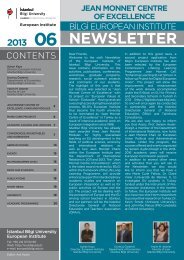WP2 Turkey: Country Report - İstanbul Bilgi Üniversitesi | AB Enstitüsü
WP2 Turkey: Country Report - İstanbul Bilgi Üniversitesi | AB Enstitüsü
WP2 Turkey: Country Report - İstanbul Bilgi Üniversitesi | AB Enstitüsü
Create successful ePaper yourself
Turn your PDF publications into a flip-book with our unique Google optimized e-Paper software.
Social Impact of Emigration and Rural-Urban Migration in Central and Eastern Europe<br />
VT/2010/001<br />
Kuban, 2009; Kaya et al., 2009). After the enactment of the Law on Compensation in 2004,<br />
the Van Action Plan was launched in 2006 in the Van region. These initiatives attempted to<br />
address the internal displacement situation in line with international standards, and the Van<br />
Action Plan was intended to be replicated in the 13 other provinces experienced internal<br />
displacement in Southeast Anatolia.<br />
The <strong>Report</strong> of the IDMC (2009a) as well as the previous works on the issue (Ayata and<br />
Yükseker, 2005; HÜNEE, 2006; and Kaya et al., 2009) all clearly refer to the outstanding<br />
obstacles to sustainable return, including the upsurge in violence between the Turkish army<br />
and Kurdish militants since 2004 in south-eastern provinces, the continuing presence of<br />
around 60 thousand village guards 36 and close to a million landmines in provinces bordering<br />
Syria and Iraq, and the under-development of the region. Despite the enactment of the<br />
policies of RVRP and Compensation, the state authorities never formally acknowledged their<br />
responsibility for forcibly evicting the citizens from their homes and for the human rights<br />
violations committed by the security forces during the displacement. Walter Kälin, who<br />
succeeded Francis Deng as the new Representative of the Secretary General of the United<br />
Nations on Human Rights of Internally Displaced Persons, welcomed these policies and<br />
initiatives but pointed out that <strong>Turkey</strong> needs to do more. In a 2006 letter addressed to the<br />
government, Kälin recommended that “the Ministry of the Interior, in conjunction with other<br />
pertinent parts of Government and in consultation with civil society and internally displaced<br />
persons themselves, (…) develop a specific Plan of Action in order to turn the framework of<br />
the Integrated Strategy Document into concrete, practical measures of implementation.” 37<br />
Despite the ongoing urban violence in the metropolitan cities in <strong>Turkey</strong>, the number of the<br />
IDPs returning to their villages after almost 20 to 30 years remains very limited. According to<br />
the official figures announced in July 2009, there are around 150.000 IDPs who returned to<br />
their villages and towns (IDMC, 2010a). Others have commuted between cities and their<br />
villages of origin. The intermittent insecurity has discouraged returns and even threatened<br />
new displacement, and people have been discouraged by the continuing presence of village<br />
guard militias and of close to a million landmines in the provinces bordering Syria and Iraq.<br />
IDPs areas of origin also have fewer economic opportunities, social services and basic<br />
infrastructure.<br />
Integration of the IDPs in the big cities poses a great challenge for the local authorities.<br />
However, there are various attempts held by universities, local governments and nongovernmental<br />
organizations to incorporate the IDPs into urban life. Istanbul <strong>Bilgi</strong> University<br />
launched the Tarlabası Community Centre in Beygolu, Istanbul, in 2006 with a fund coming<br />
from the European Commission. The Centre is still running with the support of different<br />
international funds and the University. The rationale of the Centre is to resolve conflicts<br />
between the kurdish origin IDPs and the Roma residing in the neighbourhood. The Centre is<br />
providing the inhabitants of the neighbourhood with language courses, training, kindergarden<br />
facilities, legal advice, and social and psychological assistance<br />
(http://goc.bilgi.edu.tr/index.asp?t=0&lid=en).<br />
6.4. Development of Net Migration Loss/Gain Regions<br />
<strong>Turkey</strong> has become very much engaged in the Civil Society Dialogue Projects under the<br />
umbrella of the European Union. While the universities and research centres intend to use<br />
the Civil Society Dialogue to identify more effective policies on migration, there are<br />
organisations working with local communities focusing their dialogue on the ways to improve<br />
service provision to migrants. There are a few projects funded by the European Commission<br />
to provide some support to the solution of economic and social integration problems in cities<br />
being major internal migrant destinations. One of them was held by an international<br />
36 The state started to arm civilians after 1985 in order to use them in its fight against the PKK; see<br />
Abdülkadir Aksu, the minister of interior, T.B.M.M. Tutanak Dergisi 97 (Dönem 22/1), June 24, 2003) -<br />
available from http://www2.tbmm.gov.tr/d22/7/7-0630c.pdf (accessed on 22 April 2011).<br />
37 Walter Kälin, Letter sent to the Permanent Mission of <strong>Turkey</strong> to the United Nations, 31 March 2006.<br />
Final <strong>Country</strong> <strong>Report</strong> <strong>Turkey</strong> 30



